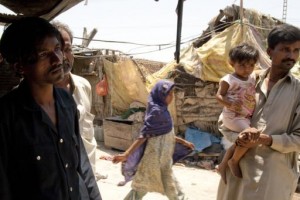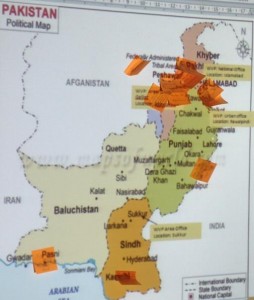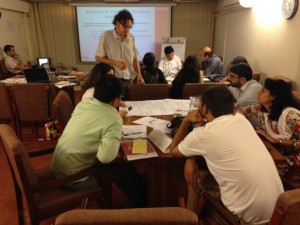Integrating Conflict Prevention and Resilience for Improved Humanitarian Programming in Pakistan
“Conflict analysis allows us to think ahead more strategically about the work we are doing.” Tim Midgley, Saferworld
On August the 1st 2015, just days after the Afghan government and Taliban’s peace talks in Islamabad are postponed, the LPRR head out to Pakistan to meet the in-county team, launch the project and conduct training around the new integrated resilience and conflict prevention training.
The START DEPP funded LPRR consortia consists of Christian Aid, Kings College London Saferworld, Muslim Aid, World Vision, Action Aid, Help Age, Concern Worldwide and Oxfam. The group discussed and analysed key conflict actors; the Pakistani Taliban, religious groups, religious extremism, other non-state armed groups and the government and military. The complexity of Afghan refugee and Internally Displaced Peoples from the FATA (Federally Administrated Tribal Areas) crises was drawn upon with over 1.5 million refugees live in camps in the Khyber Pakhtunkhwa (KPK) region alone. In response to this, the Pakistani government have banned NGOs from referring to the refugees as IDP’s (internally displaced people) and actively advocate for the use of TDP (Temporarily Displaced Peoples) instead. The group explain that these camps and people have been there for almost 40 years; a whole generation have grown up knowing nothing but camp life and have established a way of life and livelihoods here.
Therefore it was questioned; how can we strategically plan and implement long term resilience through humanitarian work when people are staying in temporary camps and not expected to live in that community in the long term? Questions such as where do these people belong? What rights do they have and how do we even begin to think about building their long term resilience?
Reflecting on our Kenya trip it is clear that while the two contexts are drastically different they appear to share a number of commonalities. Both contexts are incredibly complex and conflict actors are intertwined at all levels. It is clear exclusion, governance, religious extremism, terrorism and the states response to it are fundamental root causes of conflict in both Kenya and Pakistan. This further highlights the linkages between conflict, development and international aid.
There is no doubt that building long term resilience would support conflict prevention but how do we do this in such challenging contexts and, taking this further, how do we link up long term development to conflict response? Moreover, is this even possible?
Conflict Analysis
Whilst detailed outputs of our conflict analysis will stay with the participants for conflict sensitivity, here, the key conflict actors, power dynamics and relationships are mapped out; attitudes, behaviour and context explored in depth and how to align resilience and disaster risk reduction work to integrate conflict analysis explained.
Ultimately the crux of the LPRR consortium’s argument is that the INGO community have a responsibility to address conflict. In all conflict and hazard prone context it is important to identify and understand the causes, drivers and actors and how they relate.
To do this we can ask:
- Who are the key actors?
- What are their goals and motivations?
- How much influence do these actors have? Who are they in line with and divided with?
- What triggers and fuels this?
- What divides and connects the actors?
- What could this actor do to support peace/ provoke conflict?
- Is this actor a winner or loser in relation to the resources available?
Conflict Sensitivity and Prevention in DRR and Resilience Building
Next the team practiced adapting and putting into practice DRR and Resilience building tools such as the Community Mapping tool, Seasonal Calendar and Timeline to include core questions that draw out conflict analysis, triggers and conflict sensitivity aspects.
Challenging of Humanitarian Response Programming:
Finally the team reflected upon the major challenges standing in the way of developing humanitarian response programmes in such complex contacts that can be effectively underpinned by longer term, resilience building approach.
Here the team mapped out 10 core challenges that are thought to stand in the way of improving humanitarian programming and develop methods which build resilience and capacity to prepare for future crises:
- Lack of practical guidance around what works
- Poor, complex, fragmented governance
- Weak institutions
- The poor relationship, misunderstanding and a lack of trust between the INGO’s and government
- A context of protracted crisis; Afghanistan Refugees, Internally Displaced Peoples and ongoing conflict and insecurity
- Lack of coordination between INGO’s and the state
- Lack of long term international funding for Pakistan
- Disaster preparedness and response are not priorities for the Pakistani government
- Lack of accountability at all levels
- General lack of trust and poor relationship between the people, government, political parties, army and the INGO community
Next steps
Next the Pakistan team will pilot their conflict sensitivity training and implement integrated conflict prevention and resilience building projects in five communities in the Khyber Pakhtunkhwa (KPK) region. Watch this space for progress, updates and more information.
Author: By Becky Murphy (Christian Aid and Kings College London)
About Author: Becky Murphy is a Resilience Learning and Capacity Building Officer at Christian Aid and a Researcher at Kings College London
More information
For more information on the START DEPP Linking Preparedness Resilience and Response project or about the Kenya workshop please get in contact with Becky Murphy at rmurphy@christian-aid.org. Alternatively visit the website here: http://www.start-network.org/how/start-build/linking-preparedness-response-resilience/


